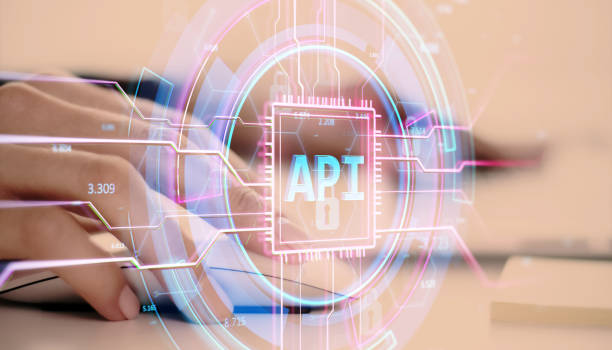What is Artificial Intelligence? Definitions and Basic Concepts
Artificial Intelligence (AI) Artificial Intelligence, in short, is the imitation of human intelligence in machines.
This field allows machines to perform tasks that usually require human intelligence, such as learning, problem-solving, decision-making, and pattern recognition.
#Artificial_Intelligence is not just a technology, but a collection of methods, algorithms, and techniques that together create an intelligent system.
Key concepts in #Artificial_Intelligence include:
– Machine Learning Machine Learning: Algorithms that allow machines to learn from data without being explicitly programmed.
– Neural Networks Neural Networks: Models inspired by the structure of the human brain and used for pattern recognition and deep learning.
– Natural Language Processing: The ability of machines to understand and generate human language.
Artificial intelligence is actually seeking to create systems that can think, learn, and act like humans.
The ultimate goal is to build machines that are capable of solving complex problems and performing diverse tasks automatically.
Are you disappointed with the low conversion rate of your online store?
Rasaweb with professional online store design is your definitive solution!
✅ Increase your sales and income
✅ Unparalleled user experience for your customers
⚡ Get a free consultation right now!
The History of Artificial Intelligence: From Dream to Reality
The history of artificial intelligence is a fascinating journey from early ideas to today’s remarkable advances.
The idea of building thinking machines dates back to ancient times, but the official birth of artificial intelligence as a scientific discipline dates back to the Dartmouth Conference in 1956.
At this conference, prominent researchers gathered to discuss the possibility of building machines that can think.
The early decades of artificial intelligence were accompanied by great optimism and hope.
Researchers believed that they could build machines that surpass human intelligence in a short time.
However, progress was slower than expected, and expectations were not met.
This period is known as the “AI winter,” a period when research funding declined and interest in the field waned.
Click here to preview your posts with PRO themes ››
In the 1980s and 1990s, with the emergence of new algorithms and the increasing computational power of computers, artificial intelligence was revived.
Machine learning and neural networks emerged as powerful tools for solving complex problems.
Today, artificial intelligence is transforming various industries and is increasingly influencing our daily lives.
From voice assistants to self-driving cars, artificial intelligence is changing the world around us.
This transformation continues, and the future of artificial intelligence is full of new possibilities and challenges.
Applications of Artificial Intelligence in Today’s World
Today, artificial intelligence artificial intelligence has many applications in various industries and has affected our daily lives.
In the field of health and medicine, artificial intelligence helps doctors diagnose diseases, provide personalized treatments, and develop new drugs.
In the financial industry, artificial intelligence is used to detect fraud, manage risk, and provide better services to customers.
In the field of transportation, self-driving cars are able to drive without human intervention using artificial intelligence.
In the manufacturing industry, artificial intelligence helps to improve production processes, reduce costs, and increase the quality of products.
In addition, artificial intelligence has widespread applications in other fields such as education, marketing, security, and entertainment.
Voice assistants like Siri and Alexa are prime examples of the use of artificial intelligence in our daily lives.
Artificial intelligence has the potential to improve many aspects of our lives and help solve complex problems.
However, the use of artificial intelligence also requires attention to ethical and social issues.
Below are tables of artificial intelligence applications in 2 different fields:
| Application | Description |
|---|---|
| Disease Diagnosis | Using machine learning algorithms to diagnose diseases from medical images |
| Personalized Treatment | Providing treatments tailored to each individual’s genetic characteristics and lifestyle |
| Drug Development | Accelerating the process of discovering and developing new drugs |
| Application | Description |
|---|---|
| Fraud Detection | Identifying suspicious patterns in financial transactions to prevent fraud |
| Risk Management | Assessing and managing financial risks using forecasting algorithms |
| Customer Service | Providing better and faster services to customers through chatbots and virtual assistants |
Types of Artificial Intelligence: A Closer Look
Artificial intelligence artificial intelligence can be divided into different categories based on their abilities and performance.
One of these categories is based on the level of intelligence:
– Narrow AI: This type of artificial intelligence is only skilled in a specific area.
Most artificial intelligence systems we use today are of this type.
Examples include voice assistants, facial recognition systems, and product recommendation algorithms.
– General AI: This type of artificial intelligence has the ability to do anything a human can do.
Strong artificial intelligence is still a theoretical concept and has not yet been fully realized.
– Super AI: This type of artificial intelligence surpasses human intelligence and can solve problems more creatively and efficiently than humans.
Super AI is also still a theoretical concept, and there are concerns about its potential dangers.
Another categorization of artificial intelligence is based on how it learns: supervised learning, unsupervised learning, and reinforcement learning.
Did you know that a weak company website loses you many opportunities every day? Solve this problem forever with professional company website design by Rasaweb!
✅ Create a powerful and reliable image of your brand
✅ Targeted attraction of new customers and increased sales
⚡ [Get a free website design consultation]
Advantages and Disadvantages of Using Artificial Intelligence
Using artificial intelligence has many advantages.
This technology can help increase productivity, reduce costs, improve accuracy and speed in doing tasks, and provide better services to customers.
Artificial intelligence can also be used to solve complex problems and perform dangerous tasks that are difficult or impossible for humans.
However, the use of artificial intelligence also has disadvantages.
One of the most important of these disadvantages is the potential loss of jobs due to automation.
Artificial intelligence can also create discrimination and inequality, especially if algorithms are trained with biased data.
There are other concerns about privacy, security, and control of artificial intelligence.
Therefore, the use of artificial intelligence must be done carefully and responsibly, and attention should be paid to its ethical and social issues.
Also, solutions should be devised to reduce the negative effects of artificial intelligence on society.
Artificial intelligence is neither good nor bad in itself, but it is how we use it that determines whether artificial intelligence will be beneficial or detrimental to us.
Ethical and Social Challenges of Artificial Intelligence
The development and use of artificial intelligence raises important ethical and social challenges.
One of these challenges is accountability.
If an artificial intelligence system makes a mistake and causes harm, who will be responsible? Is it the system’s manufacturer, the user, or the artificial intelligence system itself?
Another challenge is discrimination.
If artificial intelligence algorithms are trained with biased data, they may create discrimination against certain groups of people.
For example, a facial recognition system may be less accurate in recognizing the faces of people with dark skin.
The third challenge is privacy.
Artificial intelligence systems often require a large amount of personal data to function properly.
This data may include sensitive information such as medical records, financial information, and people’s location.
Protecting this data and preventing its misuse is very important.
The fourth challenge is control.
With the advancement of artificial intelligence, there is concern that control of artificial intelligence systems may be lost from human hands.
This could have disastrous consequences.
Therefore, the development and use of artificial intelligence must be done carefully and responsibly, and attention must be paid to its ethical and social issues.
What Will the Future of Artificial Intelligence Be?
The future of artificial intelligence is very bright and full of possibilities.
It is expected that artificial intelligence will increasingly influence our daily lives in the coming years and create major transformations in various industries.
In the field of health and medicine, artificial intelligence can help develop new treatments, early diagnosis of diseases, and provide better health care.
In the transportation industry, self-driving cars can reduce traffic accidents and make traffic smoother.
In the field of education, artificial intelligence can help provide personalized education and help students learn better.
In the manufacturing industry, artificial intelligence can help improve production processes, reduce costs, and increase the quality of products.
However, the future of artificial intelligence will also bring challenges.
For example, the potential loss of jobs due to automation, concerns about privacy and security, and the need to regulate the use of artificial intelligence.
Therefore, in order to fully benefit from the advantages of artificial intelligence and prevent its potential dangers, we must pay attention to the ethical and social issues of artificial intelligence and find solutions to manage these challenges.
The future of artificial intelligence is in our hands, and we must shape it carefully and responsibly.
Machine Learning: The Beating Heart of Artificial Intelligence
Machine Learning is one of the main branches of artificial intelligence that allows machines to learn from data without being explicitly programmed.
In machine learning, algorithms are trained using data and are able to identify patterns, predict, and make decisions.
There are different types of machine learning algorithms, including supervised learning, unsupervised learning, and reinforcement learning.
In supervised learning, the algorithm is trained using labeled data, meaning that the inputs and expected outputs are known.
In unsupervised learning, the algorithm is trained using unlabeled data and must automatically identify patterns and structures.
In reinforcement learning, the algorithm is trained by interacting with an environment and receiving rewards or penalties.
Machine learning is used in many artificial intelligence applications, including image recognition, natural language processing, stock market forecasting, and fraud detection.
Machine learning is a dynamic and evolving field, and new advances in this field are constantly emerging.
Is your online sales not as expected? With Rasaweb, solve the problem of low sales and poor user experience forever!
✅ Increase visitor-to-customer conversion rate
✅ Create an enjoyable user experience and increase customer trust
⚡ Act now to receive a free consultation!
Artificial Intelligence and its Role in Iranian Industry
Artificial intelligence artificial intelligence can play an important role in the development and progress of various industries in Iran.
In the oil and gas industry, artificial intelligence can help improve the exploration, production, and transmission of oil and gas.
In the agricultural industry, artificial intelligence can help optimize water and fertilizer consumption, forecast crop yields, and manage pests.
In the manufacturing industry, artificial intelligence can help improve production processes, reduce costs, and increase the quality of products.
In the service industry, artificial intelligence can help provide better and faster services to customers.
However, the use of artificial intelligence in Iran also faces challenges, including a shortage of skilled labor, a lack of investment, and the absence of suitable infrastructure.
The government and the private sector must work together to address these challenges and create a suitable ecosystem for the development and use of artificial intelligence in Iran.
Artificial intelligence can act as a driving force for economic growth and social development in Iran.
How to Prepare to Enter the World of Artificial Intelligence?
Entering the world of artificial intelligence requires learning and acquiring specific skills.
The first step is to learn the basic concepts of artificial intelligence and machine learning.
You can use online courses, books, and articles to learn these concepts.
The second step is to learn the programming languages used in artificial intelligence.
Python is one of the most popular programming languages for artificial intelligence.
You should also become familiar with the various artificial intelligence tools and libraries.
The third step is to gain practical experience.
You can gain practical experience by doing small projects and participating in artificial intelligence competitions.
The fourth step is to create a communication network.
By attending artificial intelligence conferences and events, you can meet experts and enthusiasts in this field and find new job opportunities.
Entering the world of artificial intelligence requires effort and perseverance, but by learning the necessary skills and gaining practical experience, you can succeed in this field.
Frequently Asked Questions
| Question | Answer |
|---|---|
| 1. What is Artificial Intelligence (AI)? | It is a branch of computer science that aims to create machines capable of mimicking human intelligence and performing tasks that require human thinking, such as learning, problem-solving, and decision-making. |
| 2. What are the main types of Artificial Intelligence? | It can be classified into Weak Artificial Intelligence (Narrow AI) that focuses on a specific task, General Artificial Intelligence (General AI) that possesses comprehensive human capabilities, and Super Artificial Intelligence (Super AI) that surpasses human intelligence. |
| 3. Mention some common applications of Artificial Intelligence in our daily lives. | Includes voice assistants (such as Siri and Alexa), recommendation systems (such as Netflix and Amazon), self-driving cars, facial recognition systems, and spam filters. |
| 4. What is the difference between Artificial Intelligence and Machine Learning? | Artificial intelligence is the broader concept of creating intelligent machines, while machine learning is a subset of artificial intelligence that focuses on enabling systems to learn from data without explicit programming. |
| 5. What is Deep Learning? | It is a subset of machine learning that uses multi-layered artificial neural networks (deep neural networks) to process data and discover complex patterns, and is used in image and speech recognition. |
| 6. What are the most prominent benefits of Artificial Intelligence? | Improving efficiency and productivity, automating repetitive tasks, making better decisions based on big data analysis, and developing solutions to complex problems in fields such as medicine and science. |
| 7. What are the main challenges facing the development and deployment of Artificial Intelligence? | Includes the need for vast amounts of high-quality data, privacy and security issues, bias in data and algorithms, and high development and maintenance costs. |
| 8. Does Artificial Intelligence raise ethical or social concerns? | Yes, it raises concerns about privacy, algorithmic bias, job loss due to automation, responsibility for errors made by intelligent systems, and the need for a regulatory framework. |
| 9. How can Artificial Intelligence affect the future of the labor market? | It can lead to the automation of some routine jobs, but it will also create new jobs requiring advanced skills in developing, operating, and maintaining artificial intelligence systems. |
| 10. What are some of the modern or promising technologies in the field of Artificial Intelligence? | Includes Advanced Natural Language Processing (NLP) (such as large language models like ChatGPT), Computer Vision, Robotics, and Generative AI. |
And other services of Rasa Web Advertising Agency in the field of advertising
Smart Social Media: A dedicated service for growth and increased sales based on SEO-driven content strategy.
Smart Google Ads: Transform digital branding with the help of Google Ads management.
Smart Brand Identity: A creative platform for improving sales using real data.
Smart Brand Identity: A dedicated service for growth and increased sales based on attractive user interface design.
Smart Google Ads: A professional solution for attracting customers with a focus on precise audience targeting.
And more than hundreds of other services in the field of internet advertising, advertising consulting and organizational solutions
Internet Advertising | Advertising Strategy | Advertorial
Resources
Artificial Intelligence: Threat or Opportunity? National Security and Privacy Areas
,Artificial Intelligence and Serious New Dangers
,Artificial Intelligence in the Shadow of Public Relations
,Warning Functions Ten Years of AIs Offer Their Services in Iran
? For a leap in your business in the digital world, Rasaweb Digital Marketing Agency, with expertise in areas such as WordPress website design, SEO, and content marketing, provides innovative and targeted solutions.
📍 Tehran, Mirdamad Street, next to the Central Bank, Kazerun South Alley, Ramin Alley No. 6












